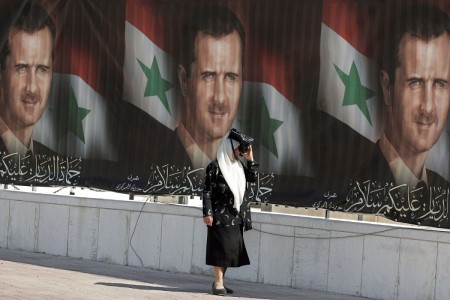Writing for the Carnegie Endowment for International Peace, Aron Lund dissects last week’s re-election of President Assad, concluding:
To ask whether the June 3 results will lead to any change within the Syrian government betrays a misunderstanding of the situation: what just played out in Syria was not an election — it was a demonstration of power.
See also Syria Op-Ed: This Election is a Cruel Farce
The results are in and Bashar al-Assad has won his third seven-year term as president of Syria with a score of 88.7% of the votes….
But of course it’s all a fraud and not even a very convincing one. That is not to say that Assad doesn’t have real supporters and wouldn’t stand a chance in a fair election — he does and he would. But even disregarding the fact that Syria is torn asunder by civil war, there was never any chance that an election held under the current political system could be democratic. The constitution is a machinery for reelection and there has not been any independent campaigning, no debate between the candidates, and no political programs declared.
The balloting itself was a predictable mess according to reports from the scene, with election officials working hand-in-hand with the president’s campaign staff and citizens (and some non-citizens) voting multiple times or on behalf of others. The general atmosphere seems to have been little different from any other pro-Assad rally.
In any case, as Joseph Stalin once quipped, the important thing isn’t who votes but who counts the votes. The official results are transparently false. For example, the government claims that a total of 11,634,412 Syrians took part in the election. Assad currently controls some 60% of Syria’s approximately 22 million citizens — maybe even more — but two out of five would have been too young to vote. Even under the demonstrably false premise that every single adult in Assad-held territory went to the polls and was joined by every single adult refugee abroad, the result would still be a million or so short of the official figure.
And since the basic voter participation rates are fake, the government must have, of course, also fixed Assad’s 88.7 percent. In fact, had the votes been counted honestly, the President would surely have strayed into the higher decimals of 99 percent, given that voting was typically not secret and most participants simply did what they were there to do, which was to demonstrate their submission to the regime.
The Politics of “As If”
In her brilliant book Ambiguities of Domination (University of Chicago Press 1999), Professor Lisa Wedeen of the University of Chicago famously described former president Hafez al-Assad’s cult of personality as “the politics of as if”—a system of state-enforced social conventions that demanded citizens to routinely “provide external evidence of their allegiance to a cult whose rituals of adulation are manifestly unbelievable.”
Under the Assad family, daily life has been inundated with symbols of regime dominance. Citizens were raised to learn the politically correct opinions as a form of automatic speech and expected to enthusiastically participate in pointless single-candidate elections and pro-Assad demonstrations, shouting slogans that a sane person couldn’t actually believe. The point was not to convince anyone but to make everyone lie. It was a self-sustaining mechanism for social control, where routine demonstrations of complicity in the cult was the norm and silent refusal would stand out no less than open protest.
On June 3, the politics of “as if” were on full display. Lots of paper slips were stuffed into plastic boxes and millions of Syrians went through the motions of waiting for a result — as if any of it actually mattered.
By holding elections on schedule and in such a way that everyone knew the outcome, Assad managed to successfully project a message of self-confidence, stability, and business as usual. By showing that he alone is able to mobilize millions of Syrians to go to the polls—some enthusiastically and some reluctantly, but all quite aware of their role in the ritual — he commands respect.

